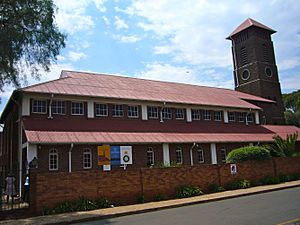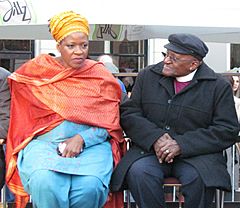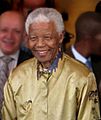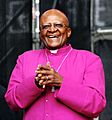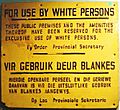Desmond Tutu facts for kids
Quick facts for kids The Most Reverend OMSG CH GCStJ |
|
|---|---|
|
|
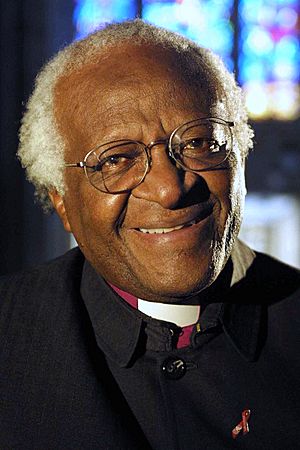
Tutu c. 2004
|
|
| Church | Anglican Church of Southern Africa |
| See | Cape Town |
| Enthroned | 7 September 1986 |
| Reign ended | 23 June 1996 |
| Predecessor | Philip Russell |
| Successor | Njongonkulu Ndungane |
| Other posts |
|
| Orders | |
| Ordination |
|
| Consecration | 1976 |
| Personal details | |
| Birth name | Desmond Mpilo Tutu |
| Born | 7 October 1931 Klerksdorp, South Africa |
| Died | 26 December 2021 (aged 90) Cape Town, South Africa |
| Spouse |
Nomalizo Leah Shenxane
(m. 1955) |
| Children | 4, including Mpho |
| Education |
|
| Signature | |
Desmond Mpilo Tutu OMSG CH GCStJ (7 October 1931 – 26 December 2021) was a South African Anglican bishop and human rights activist. He was Bishop of Johannesburg from 1985 to 1986 and then Archbishop of Cape Town from 1986 to 1996, the first black African to hold these positions. He had won the 1984 Nobel Peace Prize.
Contents
Early life
Desmond Mpilo Tutu was born on 7 October 1931 in Klerksdorp, Transvaal, South Africa. He was of mixed Xhosa and Motswana heritage. At home, his parents spoke the Xhosa language.
His father, Zachariah Zelilo Tutu worked as the principal of a Methodist primary school and the family lived in the mud-brick schoolmaster's house in the yard of the Methodist mission.
The Tutus were poor. In 1936, the family moved to Tshing, where Zachariah became principal of a Methodist school. There, Tutu started his primary education, learned Afrikaans, and became the server at St Francis Anglican Church. He developed a love of reading, particularly enjoying comic books and European fairy tales.
Tutu entered the Johannesburg Bantu High School in 1945, where he excelled academically. Joining a school rugby team, he developed a lifelong love of the sport. Outside of school, he earned money selling oranges and as a caddie for white golfers.
He became a server at the Church of Christ the King in Sophiatown and came under the influence of its priest, Trevor Huddleston. In 1947, Tutu contracted tuberculosis and was hospitalised in Rietfontein for 18 months, during which he was regularly visited by Huddleston.
He returned to school in 1949 and took his national exams in late 1950, gaining a second-class pass.
College
Tutu was admitted to study medicine at the University of the Witwatersrand, but his parents could not afford the tuition fees. Instead, he gained a government scholarship for a course at Pretoria Bantu Normal College, a teacher training institution, in 1951.
There, he served as treasurer of the Student Representative Council, helped to organise the Literacy and Dramatic Society, and chaired the Cultural and Debating Society. During one debating event he met the lawyer—and future president of South Africa—Nelson Mandela; they would not encounter each other again until 1990.
Career outline
- In 1954, Tutu began teaching English at Madibane High School; the following year, he transferred to the Krugersdorp High School, where he taught English and history.
- In 1960, he was ordained as an Anglican priest and in 1962 moved to the United Kingdom to study theology at King's College London.
- In 1966 he returned to southern Africa and started teaching at the Federal Theological Seminary and then the University of Botswana, Lesotho and Swaziland.
- In 1972, he became the Theological Education Fund's director for Africa, a position based in London but necessitating regular tours of the African continent.
- In 1975, he served first as dean of St Mary's Cathedral in Johannesburg and then as Bishop of Lesotho.
- From 1978 to 1985 he was Secretary General of the South African Council of Churches (SACC).
- In 1985, Tutu became Bishop of Johannesburg and in 1986 the Archbishop of Cape Town, the most senior position in southern Africa's Anglican hierarchy.
- Also in 1986, he became president of the All Africa Conference of Churches, resulting in further tours of the continent.
- After the 1994 general election, Nelson Mandela selected Tutu to chair the Truth and Reconciliation Commission to investigate past human rights abuses committed by both pro and anti-apartheid groups.
- Following apartheid's fall, Tutu campaigned for gay rights.
- In 2010, he retired from public life so that he could spend more time "at home with my family – reading and writing and praying and thinking".
Tutu was one of the most prominent opponents of South Africa's apartheid system of racial segregation and white minority rule. As an activist, he stressed non-violent protest and foreign economic pressure to bring about universal suffrage.
He was popular among South Africa's black majority and was internationally praised for his work involving anti-apartheid activism, for which he won the Nobel Peace Prize and other international awards. He also compiled several books of his speeches and sermons.
Nobel Prize
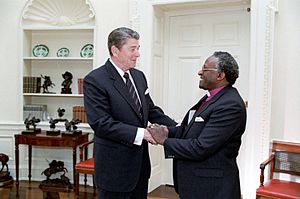
By the 1980s, Tutu was an icon for many black South Africans, a status rivalled only by Mandela. In August 1983, he became a patron of the new anti-apartheid United Democratic Front (UDF). Tutu angered much of South Africa's press and white minority, especially apartheid supporters. He received hate mail and death threats from white far-right groups.
In 1984, Tutu went New York. In the city, he was invited to address the United Nations Security Council and the Senate. He was also invited to the White House, where he unsuccessfully urged President Ronald Reagan to change his approach to South Africa.
In New York City, Tutu was informed that he had won the 1984 Nobel Peace Prize; he had previously been nominated in 1981, 1982, and 1983. In December, he attended the award ceremony in Oslo, before returning home via Sweden, Denmark, Canada, Tanzania, and Zambia.
He shared the US$192,000 prize money with his family, SACC staff, and a scholarship fund for South Africans in exile. He was the second South African to receive the award, after Albert Luthuli in 1960.
Personal life
On 2 July 1955, Tutu married Nomalizo Leah Shenxane, a teacher whom he had met while at college. They underwent a Roman Catholic wedding ceremony at the Church of Mary Queen of Apostles. Although an Anglican, Tutu agreed to the ceremony due to Leah's Roman Catholic faith.
Their first child, Trevor, was born in April 1956; a daughter, Thandeka, appeared 16 months later. They had four children: Trevor Thamsanqa, Theresa Thandeka, Naomi Nontombi and Mpho Andrea, all of whom attended the Waterford Kamhlaba School in Swaziland. Du Boulay referred to him as "a loving and concerned father", while Allen described him as a "loving but strict father" to his children.
Personality
His bioghrapher, Shirley Du Boulay, noted that Tutu was "a man of many layers" and "contradictory tensions". His personality has been described as warm, exuberant, and outgoing.
Du Boulay noted that as a child, Tutu had been hard-working and "unusually intelligent". She added that he had a "gentle, caring temperament and would have nothing to do with anything that hurt others", commenting on how he had "a quicksilver mind, a disarming honesty".
Tutu was rarely angry in his personal contacts with others, although could become so if he felt that his integrity was being challenged. He had a tendency to be highly trusting, something which some of those close to him sometimes believed was unwise in various situations.
Tutu had a passion for preserving African traditions of courtesy. He could be offended by discourteous behaviour and careless language. He could get very upset if a member of his staff forgot to thank him or did not apologise for being late to a prayer session. He also disliked gossip and discouraged it among his staff.
He was very punctual, and insisted on punctuality among those in his employ. Du Boulay noted that "his attention to the detail of people's lives is remarkable", for he would be meticulous in recording and noting people's birthdays and anniversaries. He was attentive to his parishioners, making an effort to visit and spend time with them regularly; this included making an effort to visit parishioners who disliked him.
He was often praised for his public speaking abilities; Du Boulay noted that his "star quality enables him to hold an audience spellbound".
Desmond Tutu quotes
- “Do your little bit of good where you are; it's those little bits of good put together that overwhelm the world.”
- “Don't raise your voice, improve your argument.”
- “Forgiving is not forgetting; its actually remembering--remembering and not using your right to hit back. Its a second chance for a new beginning.”
- “Differences are not intended to separate, to alienate. We are different precisely in order to realize our need of one another.”
- “If you are neutral in situations of injustice, you have chosen the side of the oppressor.”
Death
Tutu died from cancer at the Oasis Frail Care Centre in Cape Town on 26 December 2021, aged 90.
Tutu's body lay in state for two days before the funeral.
For several days before the funeral the cathedral rang its bells for 10 minutes each day at noon and national landmarks, including Table Mountain, were illuminated in purple in Tutu's honour.
A Funeral Mass was held for Tutu at St. George's Cathedral in Cape Town on 1 January 2022. Attendance at the funeral was limited to 100 due to COVID-19 pandemic restrictions. His ashes are interred in St. George's Cathedral.
Interesting facts about Desmond Tutu
- Tutu had an older sister, Sylvia Funeka, who called him "Mpilo" (meaning 'life'). He was his parents' second son; their firstborn boy, Sipho, had died in infancy. Another daughter, Gloria Lindiwe, was born after him.
- Tutu was sickly from birth; polio atrophied his right hand.
- He had a close relationship with his father.
- As well as English, Tutu could speak Zulu, Sotho, Tswana, and Xhosa.
- He was reportedly bad at managing finances and prone to overspending, resulting in accusations of irresponsibility and extravagance.
- Tutu had a lifelong love of literature and reading.
- He was a fan of cricket.
- To relax, Tutu enjoyed listening to classical music and reading books on politics or religion.
- His favourite foods included samosas, marshmallows, fat cakes, and Yogi Sip.
- Tutu woke at 4 am every morning, before engaging in an early morning walk, prayers, and the Eucharist. On Fridays, he fasted until supper.
- Tutu was a committed Christian from boyhood.
Writings
Tutu is the author of seven collections of sermons in addition to other writings:
- Crying in the Wilderness, Eerdmans, 1982. ISBN: 978-0-8028-0270-5
- Hope and Suffering: Sermons and Speeches, Skotaville, 1983. ISBN: 978-0-620-06776-8
- The War Against Children: South Africa's Youngest Victims, Human Rights First, 1986. ISBN: 9780934143004
- The Words of Desmond Tutu, Newmarket, 1989. ISBN: 978-1-55704-719-9
- The Rainbow People of God: The Making of a Peaceful Revolution, Doubleday, 1994. ISBN: 978-0-385-47546-4
- Worshipping Church in Africa, Duke University Press, 1995. ASIN B000K5WB02
- The Essential Desmond Tutu, David Phillips Publishers, 1997. ISBN: 978-0-86486-346-1
- No Future Without Forgiveness, Doubleday, 1999. ISBN: 978-0-385-49689-6
- An African Prayerbook, Doubleday, 2000. ISBN: 978-0-385-47730-7
- God Has a Dream: A Vision of Hope for Our Time, Doubleday, 2004. ISBN: 978-0-385-47784-0
- Desmond and the Very Mean Word, Candlewick, 2012. ISBN: 978-0-763-65229-6
- The Book of Forgiving: The Fourfold Path for Healing Ourselves and Our World, HarperOne, 2015. ISBN: 978-0062203571
- The Book of Joy: Lasting Happiness in a Changing World, coauthored by His Holiness the 14th Dalai Lama, 2016, ISBN: 978-0-67007-016-9
Images for kids
-
Tutu with former Irish president Mary Robinson, British foreign secretary William Hague, and former US president Jimmy Carter in 2012
-
Tutu with the Dalai Lama, both Nobel Peace Prize laureates, in Vancouver, British Columbia, in 2004
-
Tutu at the World Economic Forum in 2009
-
Tutu at the University of Pennsylvania
See also
 In Spanish: Desmond Tutu para niños
In Spanish: Desmond Tutu para niños
- List of black Nobel laureates
- List of civil rights leaders
- List of peace activists
- Political theology in Sub-Saharan Africa
- Reconciliation theology


